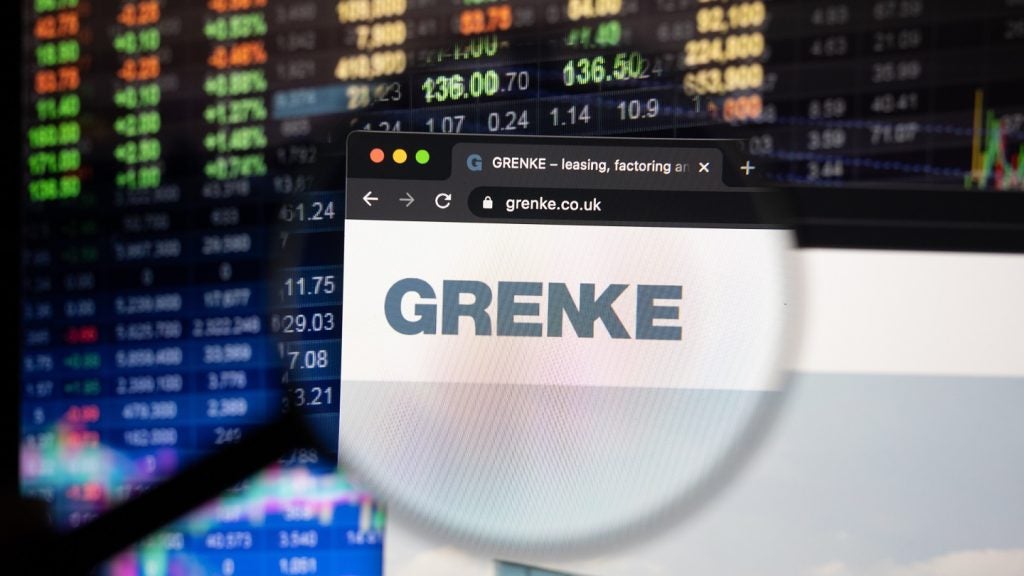Claire Hack reports from the Ukrainian Union of Lessors’
annual conference in Kiev.
The Ukrainian leasing market is on the road to recovery in 2011,
and optimism is certainly returning, said Roman Ivanenko, deputy
head of the board at the Ukrainian Union of Lessors (UUL) and
chairman of the board of Euro Leasing.
Speaking at UUL’s second annual
conference in May, Ivanenko said he expects leasing in the Ukraine
to increase to 5% of total financial activity.
“We think it will be worth between
UAH36bn and UAH37bn [€3.2bn and €3.3bn] in the next year,” Ivanenko
said.
“We also see significant interest
from leasing companies in Russia aimed at our market. This will
prevail in the current year.”
How well do you really know your competitors?
Access the most comprehensive Company Profiles on the market, powered by GlobalData. Save hours of research. Gain competitive edge.

Thank you!
Your download email will arrive shortly
Not ready to buy yet? Download a free sample
We are confident about the unique quality of our Company Profiles. However, we want you to make the most beneficial decision for your business, so we offer a free sample that you can download by submitting the below form
By GlobalDataThe market also continues to
present opportunities for foreign lessors, Ivanenko said. Companies
including Société Générale Equipment Finance, UniCredit Leasing and
Raiffeisen Leasing all rank among the largest players in the
country.
Ivanenko added: “[Leasing] is
number two after the insurance market, according to the Commission
for Regulation of Financial Services Markets.”
The UUL has also been successful in
lobbying the Ukrainian government and, in December 2010, amendments
were made to tax legislation at the request of its board
members.
“We managed to convince legislators
about the opportunities and possibilities available to the market,”
Ivanenko said.
“Right now, there is no VAT for
financial leasing commissions. Financial intermediaries don’t
create any added value, financial intermediaries distribute value,
so if no added value – no tax on it. This discriminatory rule for
leasing companies has been abolished.”
It is also expected that the
infrastructure in place for leasing activities in Ukraine is to be
enhanced, including adjustments to the legal system with a view to
enforcing court decisions more stringently.
Ivanenko said: “We have a new
possibility to chase customers if they have lost items. As far as
development is concerned, there are no other strands with prospects
for the next year.”

Master’s degree course
launched
The UUL, in association with the
Kiev University of Economics and Trade, launched a master’s degree
in leasing in April this year.
Ivanenko said: “We wanted to launch
a training programme so we initiated the masters’ degree course. It
is another opportunity to popularise and promote leasing in
Ukraine.”
Agriculture
financing
Agriculture is among the Ukraine’s
most highly-developed industries, contributing about 8% of the
country’s GDP, yet it remains relatively under-developed in terms
of technology. This brings opportunities for lessors.
Peter Krimm, country manager for
Ukraine at John Deere Financial, said: “Ukraine is the leader in
sunflower export and it is also number three in grain export.
“It is important, if you want to
produce high-quality crops, that you have high-quality machinery.
Ukraine is definitely in deficit when it comes to tractors and
combine harvesters.”
The need for a high level of
investment opens the door for leasing companies to offer
comprehensive solutions to farm owners.
Krimm said technological
advancements include tractors fitted with satellite receivers,
aimed at further increasing efficiency by allowing farm owners to
keep track of location, fuel usage and even how much labour was
required during a given time period.
“The limitation has been the
unavailability of financing – farmers would invest in equipment
much more, if there were financing,” Krimm said.
“They need the technology to
produce more and better crops. They also want to save fuel. It is
becoming more and more of an issue.”
In the Ukraine currently, Krimm
said, there are just 13 tractors in use per hectare of arable land,
while in France and Germany, the figure is between 70 and 90.
Ukraine produces about 41m tons of
grain. About 30% of that is lost during harvest, transport,
processing, and storage, he added.
“This means about $1 billon [€705m]
in lost revenue and about 1,000 jobs that cannot be created. We
need to bring in more machines to make agriculture in Ukraine more
efficient and effective,” Krimm said.
There are drawbacks, however, as
creditworthiness remains an issue, and there are concerns over
farmers’ ability to provide sufficiently transparent information
for analysis.
“This is really limiting the
availability of financing,” Krimm said.
“The other big thing, if you look
at the broader picture, comparing Ukraine to other markets, is that
government support is missing.
“What would help a lot would be an
agricultural bank, managed by the government, who can then offer
subsidies or funding or whatever it might be.”

Renewable energy financing
in CEE
As the necessity of cutting carbon
emissions and conserving fossil fuels continues to climb up the
international agenda, renewable energy is becoming increasingly
popular across Europe.
The renewables market in central
and Eastern Europe is also growing, and with it, the need for
financing, said Dieter Scheidl, managing director of Raiffeisen
Leasing International, a major player in the region.
“Renewable energy is a non-cyclical
area, with strong arguments in its favour,” Scheidl said.
“Because of the Japanese disaster
and the worldwide aim to reduce carbon emissions, governments are
encouraged to support this kind of business.”
He added that the increasing
scarcity of fuel, coupled with rising prices, have also had a major
impact.
Scheidl said: “Using renewable
energy is also an important contribution to corporate social
responsibility.”
And the CEE area specifically could
become more attractive to international investors as the use of
subsidies for renewables spreads across the region.
“For example, last year we did a
lot of business in the Czech Republic,” Scheidl said.
Nevertheless, lessors must be wary
of changes to legislation, and a lack of regulatory guidelines, as
well as the possibility of a sudden withdrawal of subsidies.
In the Czech Republic, Scheidl
explained, Raiffeisen had just a year to set up projects as a
feed-in tariff had been implemented for that period only.
What is more, “classical” leasing
has little value in the segment, as it is heavily reliant on
project finance, he added.
“The key element is project
financing, and underlying cash flow: we base our business model on
cash flow,” Scheidl said.
“It is a very expensive source of
energy from an economic point of view, which can only really be
implemented with very high levels of subsidy.”
Raiffeisen currently has renewable
energy projects in countries including the Czech Republic,
Slovakia, Bulgaria, Romania and Poland via a new venture known as
Raiffeisen Energy and Environment – and there could be potential in
Ukraine.
“The Black Sea has very windy
conditions. The area is therefore of interest to us,” Scheidl
said.
The Ukraine has a number of other
attractions for funders looking to work in renewables, he said,
such as high energy consumption – nearly as three times as high as
in Germany.
Energy is mainly produced by gas,
coal and nuclear plants, meaning there are opportunities to bring
in other energy sources, such as wind turbines and solar
plants.
The Energy Strategy for Ukraine
2030, issued in 2006, also showed major growth and investments in
renewables. Feed-in tariffs in Ukraine are guaranteed until
2030.
Demand returns in
Russia
The Russian leasing market is
populated largely by state-owned companies but was still hit
relatively hard by the global economic crisis, said Galina Mayer,
of the United Leasing Association of Russia (ULA).
“Investments needed for industry
and production are very large. Independent [leasing] companies are
not able to support such big projects,” Mayer said.
She added that St Petersburg,
historically one of the best-performing regions in the country, had
suffered particularly badly during the crisis and had seen a major
decline from 2007 onwards.
Now, however, demand for leasing is
returning to the market, although it is mainly for rolling stock
deals, as well as other bigger ticket transactions, Mayer said.
“The fleet of railway carriages is
obsolete so there is a vast demand for transport. Trains are low
risk,” she said. “Aviation leasing takes a large share – about
13%.”
The total leasing portfolio in
Russia comes to about $36 billon, Mayer said, although the
aggressive policies of the state-owned companies mean independent
players are forced into much more niche deals, and therefore make
up a very small part of this figure.
“Competition from prices is
therefore transferred to specialisation and quality,” she
added.
ULA joined Leaseurope in March in
order to benefit from the experience of members from other European
countries on issues such as accounting, statistics and legal
matters.
A ‘new normal’ in
Europe
The leasing industry in Europe as a
whole is heading towards a “new normal” as growth re-emerges,
Leaseurope chairman Jukka Salonen said in his address at the UUL
conference.
Salonen told an audience of about
100 delegates from various segments and geographies that recovery
had begun – but market conditions have changed considerably.
Both real estate and vehicle
leasing performed well during 2010 across Europe, enjoying
respective rises in new business volumes of 12.2% and 6.1%
year-on-year, Salonen added.
“Vehicles are driving business up,”
he said at the conference, which was held at the President Hotel in
Kiev. “Those areas are showing the highest growth figures are those
with [high levels] of vehicle leasing.”
But even as growth returns, lessors
cannot expect to see conditions comparable to the pre-crisis
period, Salonen said, and this change must be embraced.
He said: “Recovery is bringing us
back to a more normal scene, but we are not getting back to the old
normal.
“We are coming to the new normal,
where the rules will be different, and changes will be
required.”
These changes include the
requirement for adequate preparation for the imminent changes to
the lease accounting standard, as well as for the implementation of
Basel III.
Salonen added: “Basel III is the biggest change in the financial
industry. There will be new standards for capital, and that means
from the original 2.5% capital ratio for tier 1, it could go up to
10 or 15%.”







